Assembled here are key sources that have shaped the modern Middle East, Zionism and Israel. We have included items that give texture, perspective and opinion to historical context. Many of these sources are mentioned in the Era summaries and contain explanatory introductions.

This is the third (1971 and 1985) and most extensive trade agreement signed between Israel and the EC/EU, emphasizing that more than half of all Israeli exports are to Europe. Virtually every conceivable area of sharing and exchange is noted in the agreement.
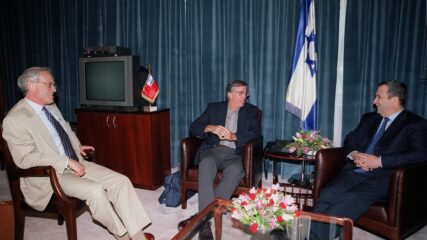
After failing to have PLO leader Yasser Arafat and Israeli Prime Minister Ehud Barak reach an understanding at Camp David in mid-2000, President Bill Clinton offers a U.S. view of a final-status agreement near the end of his term.
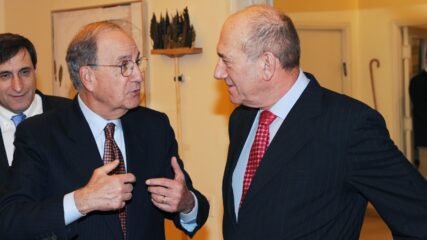
In the midst of severe Palestinian-Israeli clashes, a committee led by former U.S. Sen. George Mitchell concludes, as had many previous investigations, that the two communities fear and want to live separately from each other. From the report flows the EU-U.N.-U.S. commitment to a two-state solution suggested in the 2003 Roadmap for Peace.

CIA Director George Tenet proposes a cease-fire to stop vicious Palestinian-Israeli violence that carries on for four more years. The plan seeks to restore Palestinian-Israeli security cooperation, end incitement, arrest militants and establish mechanisms for accountability through the U.S.
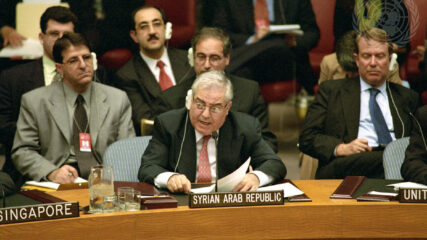
This is the first U.N. resolution to call for “two States, Israel and Palestine, to live side by side within secure and recognized borders.”

President Bush castigates PLO leader Arafat for support of terrorism and condemns Palestinian groups that “seek Israel’s destruction.” He also suggests that Israel economically support a viable Palestinian state.

As a negotiating plan it seeks an end to the conflict with reciprocal performance objectives. Israel accepts the plan with some reservations; Hamas rejects it out of hand. The plan is not enacted.
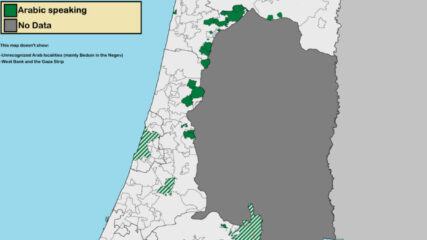
The findings of the Or Commission on the October 2000 clashes between Arab and Jewish Israelis provide context to the response of Arab citizens to the May 2021 Israeli-Palestinian fighting.
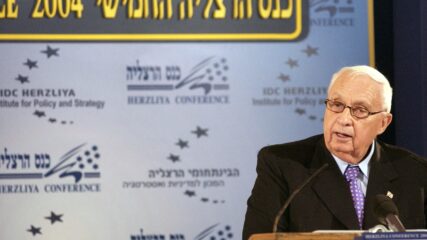
In his speech at the annual Herziliya Conference, PM Sharon articulates his view that the Quartet’s 2003 Road Map for Peace “is the only political plan accepted by Israel, the Palestinians, the Americans and a majority of the international community. We are willing to proceed toward its implementation: two states Israel and a Palestinian State living side by side in tranquility, security and peace.”

President Bush outlines view of Palestinian-Israeli settlement with Israeli Prime Minister: two state solution, borders to take into account changes in territories since 1967 War, and refugee resettlement in a future Palestinian state.
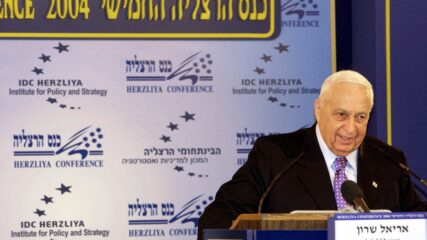
Prime Minister Sharon unilaterally withdrew Israeli military and civilian forces from the Gaza Strip in August 2005. Sharon sought to ensure Israel’s Jewish and democratic essence by getting out of the lives of the Palestinians. Instead Hamas used the territory to kill Jews and degrade Israel morally. Two decades later what would Sharon have said about trusting your neighbor unilaterally?

Israeli Prime Minister Olmert and Palestinian leader Abbas meet near Washington to kick-start negotiations by implementing previous promises; the U.S. is to judge performance to see if a treaty can result. It does not.
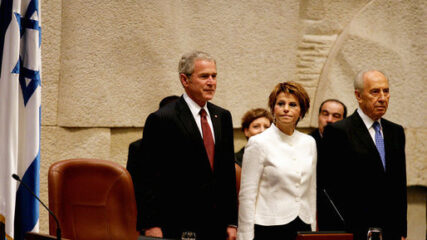
Delivering the third address by a U.S. president to the Knesset, George W. Bush celebrates Israel’s 60th birthday by emphasizing the enduring U.S.-Israel relationship based on shared values.
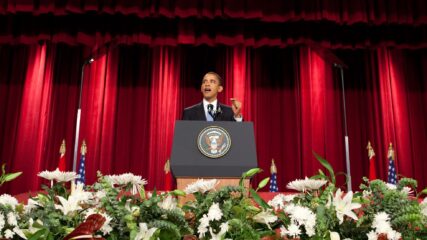
Barack Obama, while seeking to improve America’s image by urging an end to violence and stereotypes, emphasizes the need for a two-state Israeli-Palestinian solution as part of a reset of U.S. relations with the Muslim world. His advocacy of soft power distinguishes his administration from George W. Bush’s use of force. Nine years later, Donald Trump’s secretary of state, also in Cairo, heavily criticizes the Obama soft-power approach.
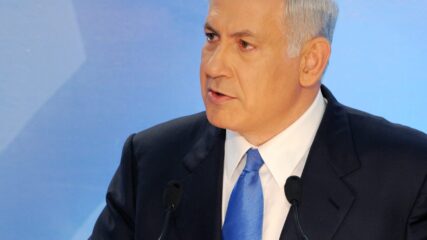
Prime Minister Benjamin Netanyahu endorses the evolution of a Palestinian state, stipulating that it must be demilitarized. He does not rule out a halt to settlement activity but says Palestinian refugees will not be resettled inside Israel’s borders.
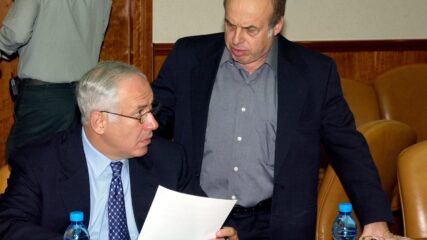
Israeli Prime Minister Benjamin Netanyahu gives five prerequisites for a peace with the Palestinians in call with the Conference of Presidents of Major American Jewish Organizations: mutual recognition, refugee resolution outside of Israel, end of conflict commitment, demilitarized Palestinian state, and guaranteed treaty or arrangement by the international community.

Focusing on the Arab Spring and Palestinian-Israeli negotiations, President Obama seeks democratic reform in the region and advocates two states for two peoples based on the 1967 lines with land swaps.
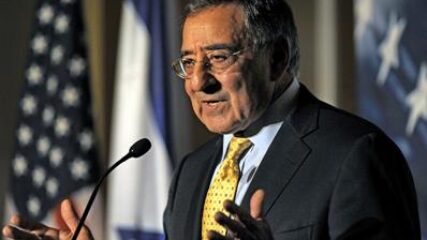
Defense Secretary Leon Panetta’s speech is typical of high American officeholders in summarizing the U.S.-Israeli relationship. Panetta affirms an unshakable relationship, support for Israeli security and the need for a negotiating progress.

Vice President Joe Biden emphatically tells a rabbinic group in Atlanta, “unambiguously, were I an Israeli, were I a Jew, I would not contract out my security to anybody, even to a loyal, loyal friend like the United States.”

In a major speech, Khalid Mishaal, the Chief of the Political Bureau of Hamas presents the organization’s vision for liberation of all of Palestine, stating that it is national duty through Jihad and armed resistance. “Palestine, from its river to its sea, from its north to its south, is the land of the Palestinians; their homeland, and their legitimate right. We will not, in any way, recognize the legitimacy of the occupation. We do not recognize the legitimacy of the Israeli occupation of Palestine, in any way.

In Jerusalem, Obama affirms the bonds in the U.S.-Israeli relationship, praises Israel’s democracy, and calls for Israelis to support a democratic Palestinian state and Palestinians to recognize Israel as a Jewish state.

As the first Canadian Prime Minister to address the Knesset, Harper asserts Canada’s long-time friendship with Israel. Two days later, Canada signs a strategic cooperation agreement with Israel.
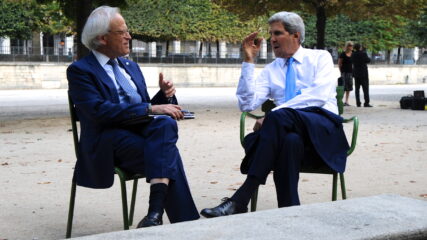
As part of the US negotiating team, Indyk enumerates why talks faltered after nine months. He asserts Israeli settlement activity undermined Palestinian trust for Israel. He also blames Palestinian indecision.
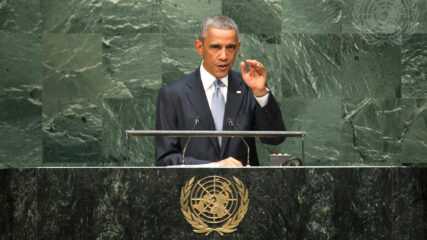
The U.S. president announces a coalition of countries to fight the Islamic State in Syria and Iraq. His plan calls for limited U.S. military action with supplies provided to others fighting on the ground.
















